 An Open Letter to University Presidents
An Open Letter to University Presidents
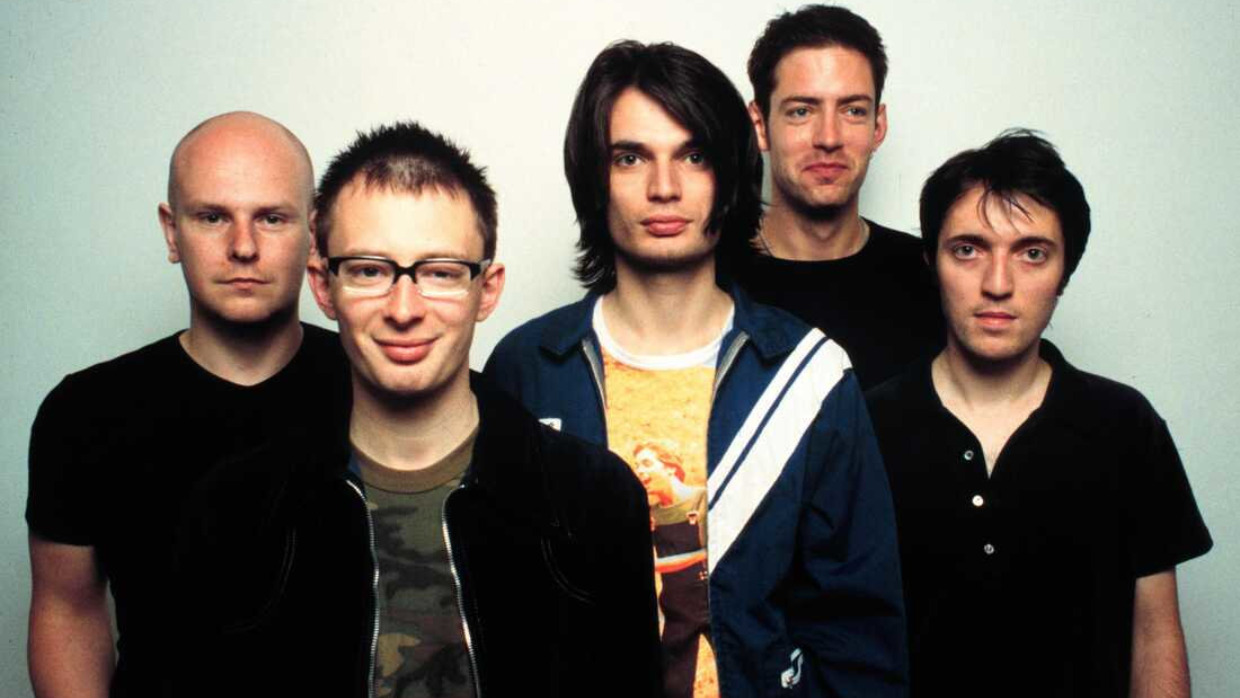

8 min read
An Israeli DJ and his Israeli listeners helped catapult Radiohead from obscurity to stardom.
Chances are you’ve heard the ghostly cries of Radiohead frontman Thom Yorke singing, "I'm a creep, I'm a weirdo," whether on the radio or from some angsty teenager’s headphones.
The multi-platinum, massive hit captured the zeitgeist at the perfect time to bring an unknown band like Radiohead to the front lines of rock music. The iconic song was so affecting to some that it was banned for being "too sad."
How was this song able to transcend countries, languages, and generations to become one of the most recognizable, heartbreaking, and important songs of the 90's? And how did Israel play a role in making Radiohead the international superstars they are today?
Before catapulting to global superstardom with their 1993 debut, Pablo Honey, Radiohead first came together as students at the Abingdon School for Boys in Oxfordshire, England, in 1985. The original lineup consisted of Thom Yorke on vocals and guitar, Ed O’Brien on guitar, Colin Greenwood on bass, and drummer Phil Selway. They initially called themselves On a Friday since that was the only day they were allowed to rehearse at school.
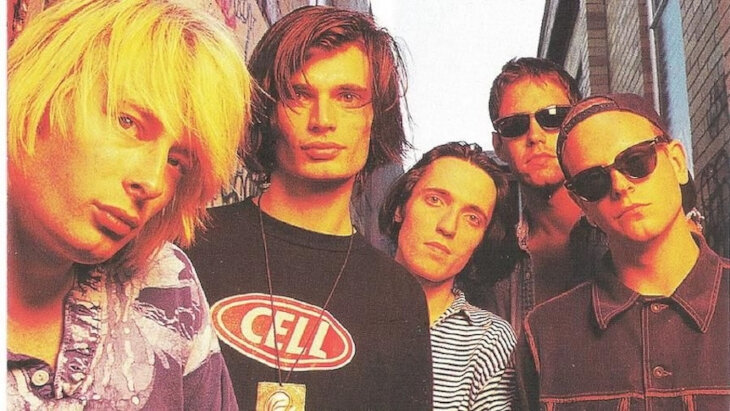 Radiohead, the early days
Radiohead, the early days
In 1987, Colin’s younger brother Jonny Greenwood joined as the lead guitarist, cementing the classic Radiohead lineup. After graduating in 1991, On a Friday changed their name to Radiohead (inspired by the Talking Heads song “Radio Head”) and scored a residency at The Jericho Tavern in Oxford. This allowed them to hone their live skills and build a local fanbase.
In late 1991, On a Friday signed with Parlophone and released their debut EP, Drill. But the EP made little commercial impact. (When the band went to buy the EP at a record store the week of its release, the owner offered to give them for free because it was the only way he could get rid of his stock.)
Recording sessions for Radiohead’s debut LP began in 1992. During this time, the band fine-tuned and expanded their song repertoire and settled on the album’s title, Pablo Honey.
Between rehearsals, Radiohead spontaneously performed another song, "Creep," which Yorke had written at Exeter University in the late 1980s. Yorke explains the inspiration for the song in an interview with John Harris in 1992: “I was in the middle of a really, really serious obsession that got completely out of hand. It lasted about eight months. And it was unsuccessful, which made it even worse.”
Radiohead initially had not planned to record "Creep" and only decided to at the suggestion of the producers in their studio. After the first take, everyone in the studio burst into applause. They knew then and there that it had to be their debut single.
Upon its first UK release, “Creep” barely made a ripple in the UK. In fact, the song was banned from BBC radio and radio stations, claiming the song was “too depressing.” (They were in good company. The BBC also banned David Bowie and The Beatles in the past).
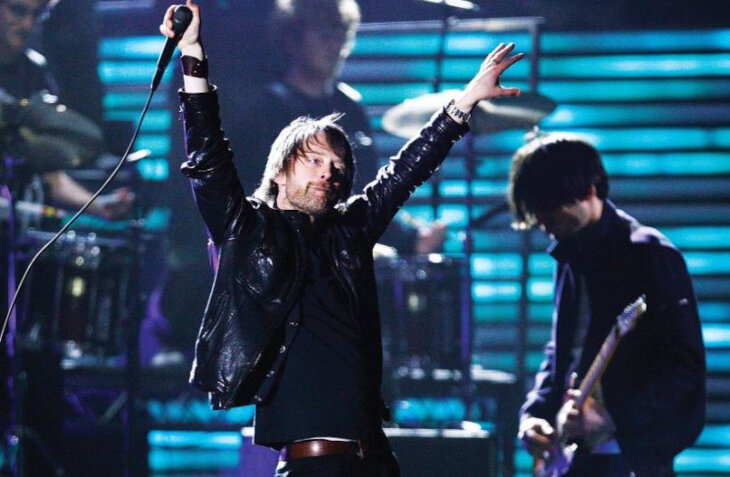
Their next single, “Anyone Can Play Guitar,” flopped as well. Both were met with lackluster reviews from critics. Chief among them was NME, who wrote devastatingly: “Radiohead are a Lily-livered excuse for a ‘rock ‘n roll’ group.” Yorke said he felt “absolutely horribly gutted” at likely blowing their big shot.
But then a sliver of hope came from an unlikely source. A moment of serendipity altered the trajectory of a band's career.
One Israeli radio’s unwavering support for "Creep" catalyzed Radiohead’s ascent from obscurity to stardom.
In early 1993, an Israeli DJ, Yoav Kutner, caught wind of “Creep” and began playing it regularly on the Israeli army radio station. Israelis ate it up, the song flew up the charts, and it would spread to every radio station in the country, becoming a national sensation. There were points in the 90s when Israeli radio listeners could count on hearing “Creep” multiple times a day. Israelis found it even more difficult to avoid the melancholic anthem in 1995 when Castro, a well-known clothing brand, featured it in a commercial for their winter collection.
Radiohead’s label caught wind of the band’s stardom in Israel and sent them for a round of concerts. When Radiohead arrived in Israel, they didn’t know what to expect. During their very first television appearance on an MTV-style TV show, “Toses,” which had up-and-coming talented musicians perform for a youth-oriented audience. The host asked Thom Yorke: “I’m sure it’s very strange for you sitting there in Oxford, writing lyrics and songs, imagining being famous in the States, in England, even in Europe maybe. Suddenly, you find out you’re very famous in…Israel of all places.”
“That was very weird,” Yorke responded. “Maybe we tapped a nerve or something.”
 Thom Yorke playing in Tel Aviv
Thom Yorke playing in Tel Aviv
Indeed, they did. Israeli fans were so into the track that when Thom and crew rolled up to promote it, fans mobbed the group and even ripped out clumps of Thom’s hair. The band played three sold-out shows to deafening cheers from Israelis trying their best to sing along.
Israel’s affinity for grunge-rock and slacker music, with Nirvana and Aviv Geffen rising to prominence in the years leading up to 1993, helped set the stage for “Creep” going viral in Israel. Its lyrics, which touch on themes of alienation and self-doubt, resonated with an Israeli youth reeling from the First Intifada. The song's emotional depth and Yorke's plaintive delivery spoke directly to the hearts of many Israelis.
Radiohead’s longtime tour manager, Tim Greaves, shared his thoughts on the band’s overnight success. “The funny thing about Radiohead early on was that they were more famous abroad than in England,” he said. “They’d go around in a van, playing in sweaty little clubs. Then they’d go to Israel, and they were rock stars.”
As Radiohead became the biggest band in Israel, things finally started looking up for them. Radio stations in Los Angeles, New Zealand, and Scandinavia began to play the song, and like a snowball, “Creep” was becoming a worldwide phenomenon. Eventually, the song reached the top 10 on the UK Billboard charts and has amassed nearly 3 billion streams on streaming platforms decades after its initial release.
The success of “Creep” gave the group some assurance that they wouldn’t be dropped from their label and the chance to record a second album.
Creep wasn’t just a monumental song for Radiohead. It also nearly broke the band up.
The band hated the song, its popularity, and the pressure it put on them to escape being labeled one-hit-wonders. “I wasn’t very happy with the lyrics; I thought they were pretty crappy,” Yorke told Rolling Stone, adding that he didn’t even feel he had ownership of the song. “When we play it, it feels like we’re doing a cover.”
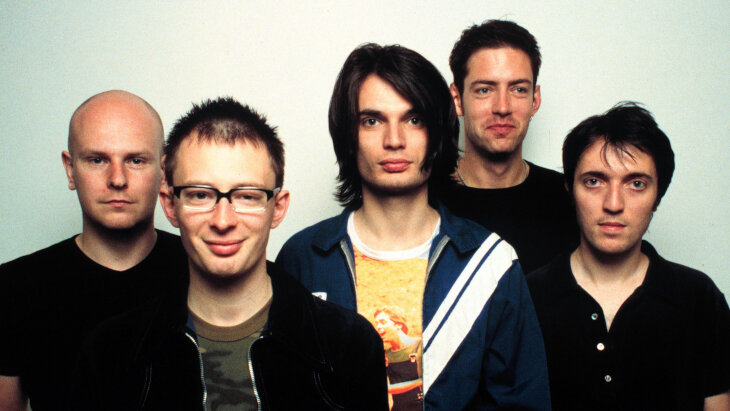 Radiohead circa 1997
Radiohead circa 1997
Despite the band’s conflicted feelings with the song that made them famous, they are in the minority. In 2007, VH1 ranked "Creep" the 31st-greatest song of the 1990s. In 2021, Rolling Stone named "Creep" number 118 in its list of the 500 greatest songs.
After the surprise breakout success of "Creep," they refused to remain a one-hit wonder. 1995's “The Bends” showcased Radiohead's knack for soaring anthems and Thom Yorke's expressive vocals. But it was “OK Computer” in 1997 that cemented them as masters of experimentation and darker moods, pioneering the alt-rock subgenre. “Kid A” in 2000 took their invention even further, employing electronic influences, dissonant textures, and cryptic lyrics for a radical reinvention.
Radiohead continued down an avant-garde path on subsequent releases like “Amnesiac” and “Hail to the Thief,” challenging mainstream conventions. Their shape-shifting sensibilities also produced mellower efforts like “In Rainbows” and “A Moon Shaped Pool.” Regardless of style, Yorke's existential angst and Radiohead's sonic adventurousness always shone through. From playing basic grunge-inspired rock to deconstructing song formulas entirely, Radiohead consistently broke new ground to become icons of rock.
They’ve performed in Israel a total of 9 times, including most recently in 2017, where they were faced with boycotts and pressure from BDS as well as a petition signed by notable musicians such as Roger Waters, Brian Eno, and Young Fathers.
"It's really upsetting that artists I respect think we are not capable of making a moral decision ourselves after all these years," acknowledged Yorke. Radiohead eventually went ahead with the show, much to the excitement of over 50,000 Israelis attending the concert.
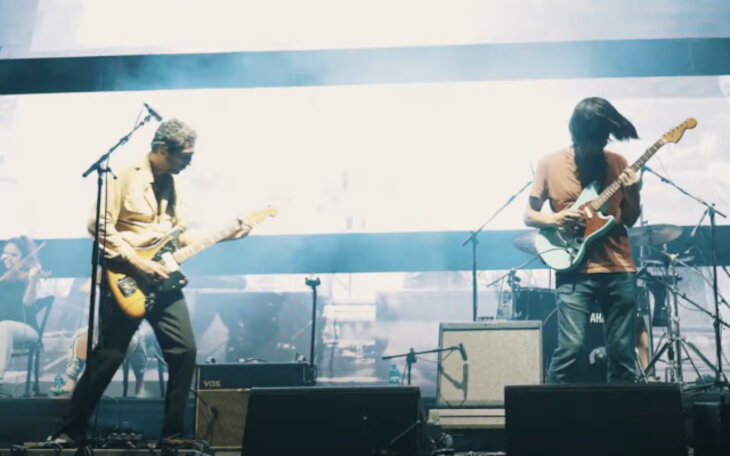 Dudu Tassa (L) and Jonny Greenwood perform in Binyamina, July 20, 2021.
Dudu Tassa (L) and Jonny Greenwood perform in Binyamina, July 20, 2021.
Israel’s been with them since the very beginning, and they’ve toured with major Israeli artists like Dudu Tassa and Shye Ben Tzur, and have been consistently pioneering Israeli talent. Guitarist Jonny Greenwood’s wife, Sharona Katan, is Israeli and the band’s ties to the country run deep.
Radiohead remain cultural icons in Israel. While the band has gone on to worldwide fame and critical acclaim, “Creep” still remains their defining song for many Israelis. It kickstarted their success and helped introduce alternative music to the Israeli mainstream. Despite the band’s tortured relationship with the song, for a generation of Israelis, “Creep” will forever remain an anthem that soundtracked their youth. Without DJ Yoav Kutner and his Israeli listeners who knows if Radiohead would have gone from unknowns to arguably Britain’s greatest modern rock export.
